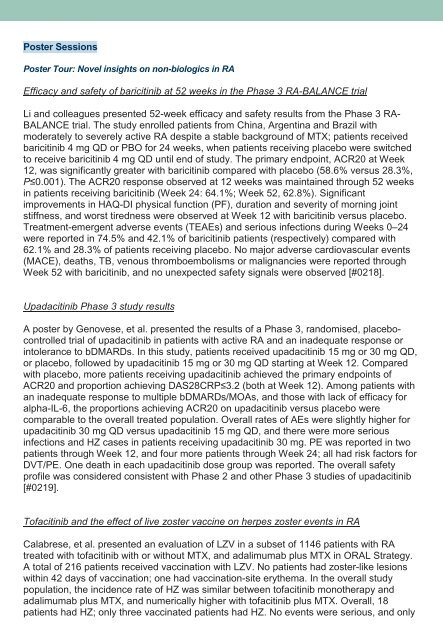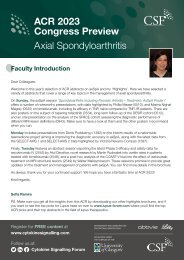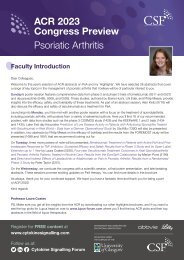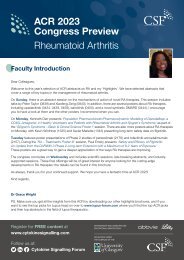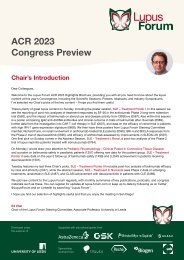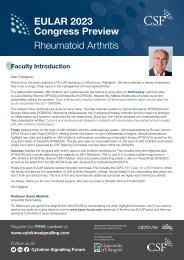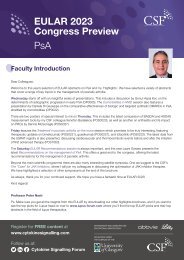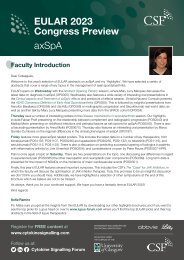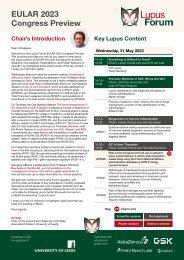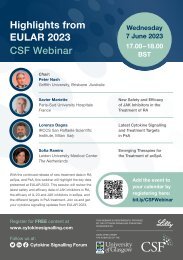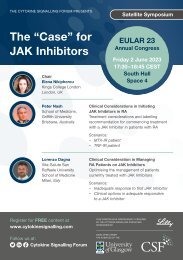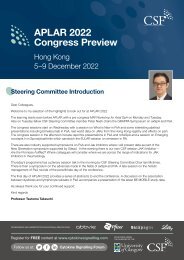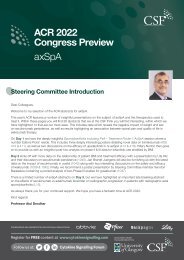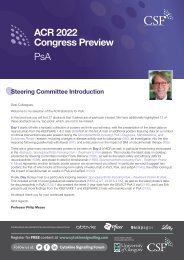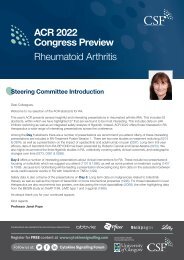EULAR 2018 Review
You also want an ePaper? Increase the reach of your titles
YUMPU automatically turns print PDFs into web optimized ePapers that Google loves.
Poster Sessions<br />
Poster Tour: Novel insights on non-biologics in RA<br />
Efficacy and safety of baricitinib at 52 weeks in the Phase 3 RA-BALANCE trial<br />
Li and colleagues presented 52-week efficacy and safety results from the Phase 3 RA-<br />
BALANCE trial. The study enrolled patients from China, Argentina and Brazil with<br />
moderately to severely active RA despite a stable background of MTX; patients received<br />
baricitinib 4 mg QD or PBO for 24 weeks, when patients receiving placebo were switched<br />
to receive baricitinib 4 mg QD until end of study. The primary endpoint, ACR20 at Week<br />
12, was significantly greater with baricitinib compared with placebo (58.6% versus 28.3%,<br />
P≤0.001). The ACR20 response observed at 12 weeks was maintained through 52 weeks<br />
in patients receiving baricitinib (Week 24: 64.1%; Week 52, 62.8%). Significant<br />
improvements in HAQ-DI physical function (PF), duration and severity of morning joint<br />
stiffness, and worst tiredness were observed at Week 12 with baricitinib versus placebo.<br />
Treatment-emergent adverse events (TEAEs) and serious infections during Weeks 0–24<br />
were reported in 74.5% and 42.1% of baricitinib patients (respectively) compared with<br />
62.1% and 28.3% of patients receiving placebo. No major adverse cardiovascular events<br />
(MACE), deaths, TB, venous thromboembolisms or malignancies were reported through<br />
Week 52 with baricitinib, and no unexpected safety signals were observed [#0218].<br />
Upadacitinib Phase 3 study results<br />
A poster by Genovese, et al. presented the results of a Phase 3, randomised, placebocontrolled<br />
trial of upadacitinib in patients with active RA and an inadequate response or<br />
intolerance to bDMARDs. In this study, patients received upadacitinib 15 mg or 30 mg QD,<br />
or placebo, followed by upadacitinib 15 mg or 30 mg QD starting at Week 12. Compared<br />
with placebo, more patients receiving upadacitinib achieved the primary endpoints of<br />
ACR20 and proportion achieving DAS28CRP≤3.2 (both at Week 12). Among patients with<br />
an inadequate response to multiple bDMARDs/MOAs, and those with lack of efficacy for<br />
alpha-IL-6, the proportions achieving ACR20 on upadacitinib versus placebo were<br />
comparable to the overall treated population. Overall rates of AEs were slightly higher for<br />
upadacitinib 30 mg QD versus upadacitinib 15 mg QD, and there were more serious<br />
infections and HZ cases in patients receiving upadacitinib 30 mg. PE was reported in two<br />
patients through Week 12, and four more patients through Week 24; all had risk factors for<br />
DVT/PE. One death in each upadacitinib dose group was reported. The overall safety<br />
profile was considered consistent with Phase 2 and other Phase 3 studies of upadacitinib<br />
[#0219].<br />
Tofacitinib and the effect of live zoster vaccine on herpes zoster events in RA<br />
Calabrese, et al. presented an evaluation of LZV in a subset of 1146 patients with RA<br />
treated with tofacitinib with or without MTX, and adalimumab plus MTX in ORAL Strategy.<br />
A total of 216 patients received vaccination with LZV. No patients had zoster-like lesions<br />
within 42 days of vaccination; one had vaccination-site erythema. In the overall study<br />
population, the incidence rate of HZ was similar between tofacitinib monotherapy and<br />
adalimumab plus MTX, and numerically higher with tofacitinib plus MTX. Overall, 18<br />
patients had HZ; only three vaccinated patients had HZ. No events were serious, and only


